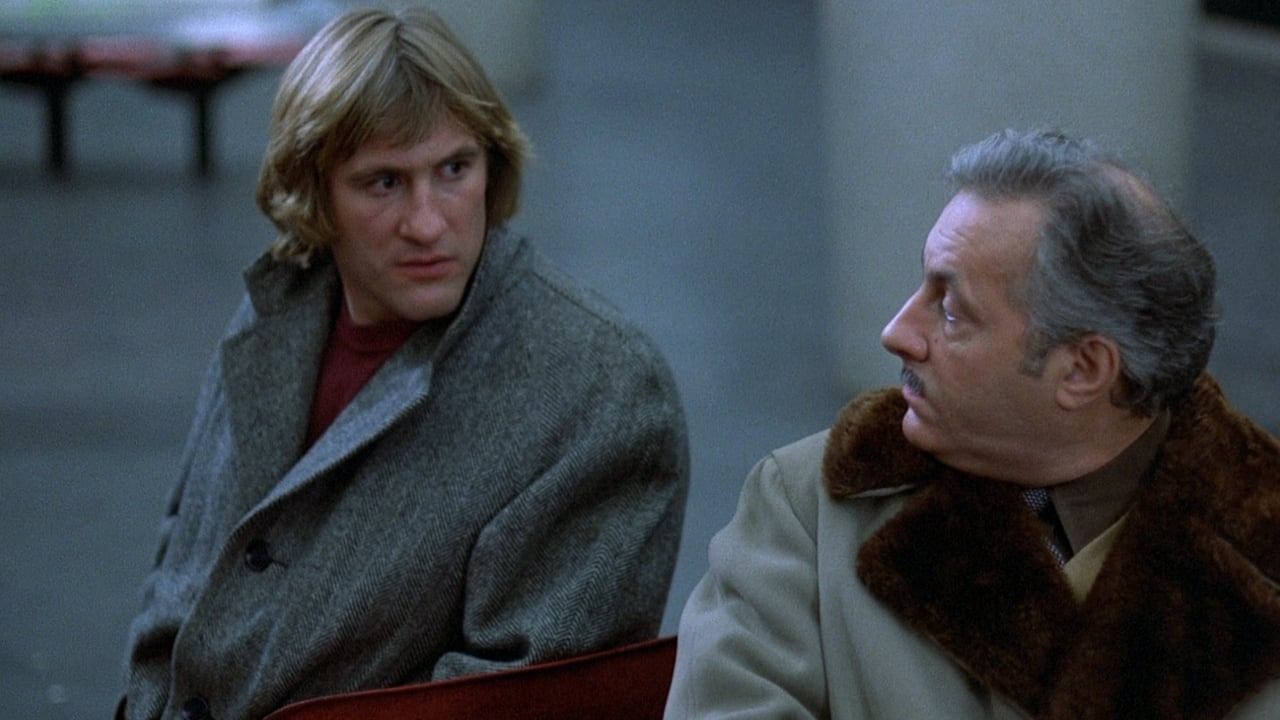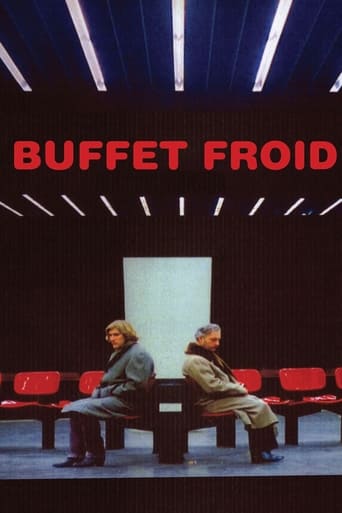irishm
I accept the fact that French cinema is very different from American movies, and I'm okay with that. I like France, the French culture, and the language... that's why I watch French films. But with this one I couldn't get past the 30-minute mark. Others have pointed out that it's of the "absurdist" school, and I guess that just isn't my cup of tea. I couldn't make any sense of it so I couldn't enjoy it. The performances were good and the cinematography was also very good. But geez, when a guy has a calm casual conversation with a man who's just been stabbed and who offers him the knife back in case he might need it in the future, I don't know what to make of it. Is it real? Is it a dream? Is it the perception of Depardieu's character, who may not be "all there"? I dunno. I gave up. On to more literal things.
FilmCriticLalitRao
French director Bertrand Blier,known for idiosyncratic films,is famous for working with different types of actors. For this film, he chose to cast 4 of the biggest male actors of France including his father Bernard Blier who gave astounding performances in a black tale set in urban milieu where each person reveals himself as crazy. Watching this film one wonders why La Défense area of Paris was always so empty. This leads us to state that what Marco Ferreri achieved in "Don't Touch the White Woman" has been achieved again by Bertrand Blier with "Buffet Froid". After the success of "Les Valseuses", Bertrand Blier thought for writing a film exclusively for Gérard Depardieu. It is in this manner that the idea of filming "Les Valseuses" was formed. He created a record of sorts by writing this film's script in 3 weeks whereas he would normally dedicate six months of his professional time to write a good script. Buffet Froid can be best described through the proverb "What goes around comes around" as its protagonists are all involved in a cat and mouse game wherein the first victim is somehow linked to the last person who is punished.
Graham Greene
DETECTIVE(S): Two men sit on a RER station platform at night. They engage in small talk. A knife is drawn. Later, one of these men will turn up dead. From here, things get ever more absurd; with the film becoming an arcane detective story in which questions are asked, but never answered, and answers are given to questions that were never asked. It's funny! And presented in the style of a surrealist nightmare of deadpan characterisations and a beautiful aimlessness that might just be a sly-social critique on the generation pre-François Mitterrand, and of the complexities of the overwhelming dislocation of modern-day existence. ABSTRACTION: The film can also be interpreted as a preposterous parody of the erosions of French national values against a jarring, Manhattan like skyline; which here seems to underpin the lost, isolation and stark confusion central to the majority of the recurring characters, as they become dwarfed by a surrounding architecture that is loaded with ideas of consumer-driven aspiration, social change and industrial improvement.WINDOWS: To capture this sense of heightened atmosphere, director Bertrand Blier makes great use of the Hauts-de-Seine area of Paris - and in particular La Défense - with its towers of glass and steel and the areas of flat concrete that take on an even more surreal and alienated quality as a result of the nocturnal setting and the film's complete lack of any such signs of life. It creates a world that is oddly compelling and completely fascinating, with the film becoming a sort of aimless, rambling, nocturnal odyssey; as an unemployed philosopher takes up with a corrupt detective and the hapless criminal that murdered his wife and embarks on a bizarre quest that seems to be about everything and nothing simultaneously. BOATING: Throughout the film, the form and presentation of Blier's script and direction seem to suggest a sort of Buñuelian take on The Last of the Summer Wine (BBC, 1973), with a few further hints to the territory of Jacques Rivette's epic, multi-layered farce, Celine and Julie Go Boating (1972) thrown in along the way. Like that film, Buffet Froid (1979) deals with playful ideas of abstraction as a picaresque charade, as we shuffle between miniature-vignettes that capture a feeling rather than a story, and a sense of idyllic, lazy meandering playfulness that occasionally jars against the darker, though always tongue-in-cheek elements of the script.ADVENTURE: The narrative is episodic and often confusing, as we find ourselves in the midst of a mad jumble of ideas and interpretations that jostle for our attention amidst the charismatic performances and the constant reliance on blistering, surrealist wit. Without question, the film is completely charming despite its seeming lack of an overall structure or plot; as three characters submerge themselves in an adventure that seems to involve roaming the nocturnal streets of Paris and engaging in darkly comic sketches of absurd role-play and duplicitous abandon. GAMES: These escapades ultimately tells us a great deal about the characters, without having to resort to lengthy scenes of dialog or interaction; with Blier building on the tone of that opening scene on the station platform and carrying it through to the later scenes, in which the deft character relationships and effortless games within the script captivate us and take us along with these ciphers on an ironic adventure that eventually closes in on itself. It naturally sounds more complicated than it actually is, however, fans of French cinema and the progressive surrealism of many of the filmmakers aforementioned - chiefly Buñuel and Rivette - will surely get a big kick out of the film's constant charm, energy, and spirited sense of subversion.INFLUENCE: Likewise, the film should also appeal to anyone with a fondness for the films of Aki Kaurismäki - whose second film, Calamari Union (1985) owes something of a debt - and the deadpan constructions of Roy Andersson's recent work, Songs From the Second Floor (2000) and You, The Living (2007). You can also see a certain influence from legendary firebrand Jean Luc Godard present in the film's disregard for genre and deconstructive approach to narrative convention; while the look and feel of Blier's film may have even gone on to influence the style of the "cinema du look" - a brief resurgence of high-concept, 80's French cinema that looked to the spirit of La Nouvelle Vague and applied it to more contemporary concerns. Films such as Diva (1981), Subway (1985) and Mauvais Sang (1986) have a similar feeling of uncertainty and dislocation, with the elements of irreverent humour and characters reduced to ironic ciphers. DECONSTRUCTION: Its self-aware cinema then; a form a film-making that self-consciously reinvents itself from one scene to the next, but somehow feels completely natural; even as we move from a low-key sequence of character interaction, to a bizarre, satirical sequence in a gloomy country-mansion!COLD-CUTS: Ultimately, I like this film because I like the characters, and I like the lazy, languorous atmosphere that is created by the situations that present themselves. This is helped by the perfect casting of an excellent Depardieu giving one of his best, comedic performances, ably supported by Jean Carmet as a nonchalant murderer and misogynist and the director's own father, esteemed actor Bernard Blier, as the contradictory police inspector. If you can appreciate this atmosphere, the dynamics of the narrative, the absurd jokes and the warm sparring of the characters then you should get a lot out of Buffet Froid, which not only offers entertainment, but a puzzle of sorts for the audience to make sense of. I can understand why some would dismiss it completely, but for me, the film is just endlessly fascinating and filled with deadpan farce that only the French can convey. It all builds incessantly to that unexpected final, in which the true absurdities of the film become apparent and Blier hits us with closing gag that somehow makes sense of the entire experience.
writers_reign
For a film that embraces Alice In Wonderland logic it's appropriate that it starts as a man (Alphonse Tram) descends into a hole in the ground and by extension into a subterranean nightmare. Having reached the train level of La Defense metro station Tram (Gerard Depardieu) ignores the acres of empty space and chooses a seat alongside the only other person there (Michel Serrault) pursuing him and engaging him in surreal conversation. At one point Tram produces a flick knife, offers it to Serrault who declines it and places it on an adjacent seat. Moments later it has disappeared despite there being no other person present. La Defense is a terminus so when a train appears, Serrault boards it and it moves off in the same direction it travelled to get there (in other words into the buffers) this is confirmation that we are in an unreal world which is perhaps a figment of Tram's imagination.A little later as Tram leaves the station he finds Serrault slumped against a wall wearing a knife that turns out to be the knife that Tram offered to Serrault which disappeared mysteriously. Serrault is philosophical about his condition and urges Tram to take his money for which he will have no further use. Tram returns home - a high-rise apartment block in which he and his wife WERE the only tenants but now, his wife tells him, there is a new tenant. Tram pays a social call and learns that the new tenant is Inspector Morvandieu (Bernard Blier, the director's father) who is not too concerned about a stiff in the subway. Then Tram's wife turns up dead and the killer (Jean Carmet) visits Tram to confess his guilt and ask for a souvenir of the dead woman. All three men share a drink when a fourth man appears, and tells Tram he knows that Tram killed Serrault, the Inspector cautions him against blackmail and the murderer asks for the new arrival's sympathy on the grounds that Tram has just lost his wife. But they needn't have worried, the new arrival merely wishes to hire Tram to kill someone else. And so it goes. All hands play this dead straight which strengthens the nightmare aspect. Eventually the fourth man is killed and his wife has already packed and is anxious to go with the other three. In a reference to Minnelli's Some Came Running she asks Tram if he ever removes his coat (he hadn't up to that point, just as 'Bama' Dillert (Dean Martin) never removed his hat in the Minnelli film). There's also an aside in which Tram and Morvandieu visit a very Charles Addams house where a classical concert is taking place. Morvandieu speaks of his aversion to classical music whereupon the hostess takes him to a bedroom, urges him to get into bed on the grounds that he isn't looking well then summons five very Charles Addams characters to play Brahms with a nod to Francois Sagan with the question 'Do you like Brahms?'. Morvandieu promptly shoots the entire quintet and later says his wife was a violinist who drove him crazy with her practicing. Watching this film is like peeling an onion soaed in lsd; layer after layer more surreal yet normal than the last. After the darkness of the urban jungle it finally emerges into full daylight for the final nightmares. The only way to approach it is on its own terms which will bring its own rewards.

